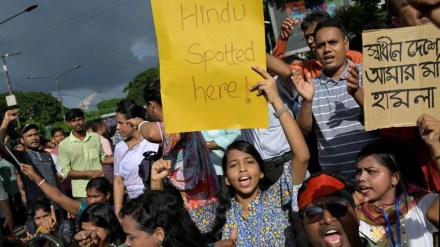In recent weeks, the growing wave of violence against Hindus and minorities in Bangladesh has drawn international concern, with the United States taking a firm stance. The US National Security Advisor (NSA), Jake Sullivan, held a significant phone conversation with the head of Bangladesh’s interim government, Mohammad Yunus, pressing him to ensure the safety of the country’s religious minorities. The conversation is part of an increasing global focus on the escalating atrocities against Hindus, which have garnered attention from both the US government and lawmakers, including a vocal member of the US Congress.
The issue of violence against Hindus in Bangladesh has escalated alarmingly, with reports showing a sharp rise in incidents. According to data from the Indian Ministry of External Affairs (MEA), there have been over 2,200 cases of violent attacks against Hindus in Bangladesh in 2024 alone, marking an increase of more than 700% compared to the previous year. In 2023, there were 300 such incidents, while in 2022, the number was significantly lower at just 47. These figures highlight the worsening situation, with many incidents involving the destruction of Hindu temples, idols, and violent assaults on Hindus who are peacefully practicing their faith.
US Takes Action Amid Concerns
The growing concern over the safety of Hindus in Bangladesh has prompted the US to take diplomatic action. In his call with Yunus, Jake Sullivan emphasized the importance of safeguarding religious minorities and upholding human rights. The White House released a statement after the conversation, underscoring that both leaders affirmed their commitment to respecting and protecting the rights of all people, regardless of their religion.
The timing of the call is significant, as it comes just weeks before the end of President Biden’s first term. The US administration is under pressure to act decisively, especially as members of Congress raise the issue in the House of Representatives. Representative Shri Thanedar, a prominent Democrat, has been vocal about the violence against Hindus in Bangladesh. Thanedar called for the US government to press Bangladesh’s leadership to take concrete steps to end the violence and restore peace, highlighting the US’s historic role in aiding victims of such atrocities.
In a speech in the House of Representatives, Thanedar condemned the attacks on Hindu temples and the destruction of religious artifacts, calling for immediate action. “The time has come for the US Congress and the US government to take action,” he asserted, referring to the ongoing persecution of Bangladesh’s Hindu community.
Bangladesh’s Response
In response to the US’s concerns, Yunus has pledged to protect human rights in Bangladesh, including the safety of religious minorities. He assured Sullivan that his government would make efforts to prevent further violence. However, the international community remains sceptical, given the sharp rise in attacks against Hindus over the past year.
Despite these assurances, the situation on the ground in Bangladesh continues to deteriorate, with minority communities feeling increasingly vulnerable. The surge in violence has led to calls for stronger international intervention and greater accountability from Bangladesh’s government.
India’s External Affairs Minister Visits the US
As the situation in Bangladesh continues to unfold, India’s External Affairs Minister (EAM), S Jaishankar, is currently on a six-day visit to the US. This visit, which began on December 24, marks the first time a senior Indian official has travelled to the US since the election of President Donald Trump. Jaishankar’s visit is expected to focus on bilateral, regional, and global issues, with an emphasis on strengthening ties between India and the US.
During his visit, Jaishankar is scheduled to meet with US Secretary of State Antony Blinken and other senior officials, as well as chair a conference of India’s consul generals in the US. The visit comes at a time of heightened diplomatic activity, as Jaishankar engages with the outgoing Biden administration. There is also the possibility of interactions with the incoming Trump administration, given the strong relationship between Prime Minister Narendra Modi and former President Trump.
Jaishankar has previously remarked that India is in a strong position to build closer ties with the incoming administration, especially in light of the personal rapport between Modi and Trump. However, he also noted that challenges could arise as India navigates the shift in US political leadership.
